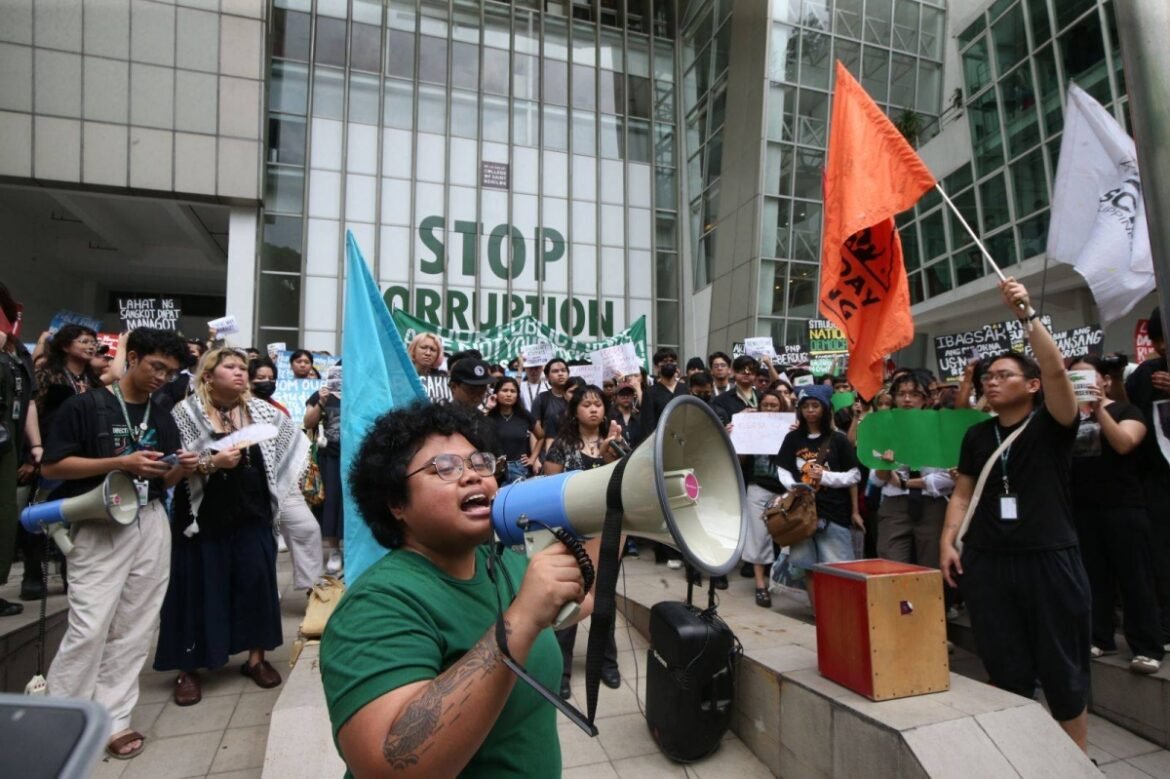(UPDATE) CORRUPTION has emerged as one of the most urgent national concerns among Filipinos, marking a historic surge in public anxiety over government integrity, according to the latest Tugon ng Masa (TNM) nationwide survey by OCTA Research.
Conducted from Sept. 25 to 30, 2025, the non-commissioned and independent survey found that 31 percent of adult Filipinos now consider fighting corruption in government as a top national priority that must be addressed immediately by the Marcos administration.
This represents a dramatic 18-point increase from 13 percent in July 2025 — the sharpest quarterly rise ever recorded in the TNM series.
Students of De La Salle-College Saint Benilde in Manila walk out of their classes on Monday, October 13, 2025, to protest corruption in government. PHOTO BY RENE H. DILAN
OCTA Research fellow Ranjit Rye said the findings suggest a “growing public demand for integrity and accountability in government” as Filipinos shift their focus from purely economic anxieties toward gov-ernance and ethical leadership.
He noted that the issue’s prominence “reflects deeper frustration with perceived corruption in gov-ernment institutions and the use of public funds.”
Inflation still top concerns
While corruption climbed to second place among national issues, controlling the rise in prices of basic goods and services remained the top concern for 48 percent of respondents, slightly down from 50 percent in July.
Other major concerns included access to affordable food (31 percent), improving wages (27 percent), and reducing poverty (23 percent).
Concern over job creation dropped sharply from 26 to 19 percent, suggesting that fewer Filipinos now view unemployment as an urgent problem compared to earlier this year.
Most alarmed by corruption
The rise in concern about corruption was especially notable in Metro Manila, where more than half of respondents — or 53 percent — said graft in government was among their top worries.
The issue also resonated more strongly among higher socioeconomic classes, with 40 percent of re-spondents from classes ABC citing corruption as an urgent concern, compared with 31 percent from Class D and 24 percent from Class E.
In contrast, concern about rising prices was highest in Mindanao at 53 percent, while access to afford-able food was most pressing in Balance Luzon at 36 percent.
Regional differences also shaped the hierarchy of concerns. Metro Manila respondents were more likely to call for wage increases, while those in Balance Luzon and Mindanao placed greater emphasis on poverty reduction. In the Visayas, stable employment and food security remained dominant priori-ties.
These variations suggest that while corruption and inflation have become national issues, economic vulnerabilities remain deeply rooted in specific regions.
Daily survival
Despite the growing anxiety over corruption, personal concerns among Filipinos have remained stable since July.
Staying healthy and avoiding illness continued to be the most pressing personal priority, cited by 63 percent of respondents.
Having enough to eat every day and providing education for one’s children were equally urgent for 49 percent of Filipinos, while 46 percent expressed concern about securing a well-paying job or income source. About 38 percent worried about becoming victims of serious crime.
OCTA said these consistent patterns indicate that household-level worries remain anchored in daily survival — health, food, education, and safety — even as political and moral issues rise in prominence.
By area, staying healthy ranked highest across all regions except Mindanao, where it shared top billing with food and education.
Concern for food security was most pronounced in Mindanao and the Visayas, while only a third of respondents in Metro Manila mentioned it.
Education-related worries were particularly strong in Balance Luzon and Mindanao.
The survey also revealed that health awareness increases with socioeconomic status, with 80 percent of Class ABC respondents prioritizing good health compared to just 53 percent among Class E.
The Tugon ng Masa Q3 2025 survey was conducted through face-to-face interviews with 1,200 adult respondents aged 18 and above. It carries a ±3 percent margin of error at a 95 percent confidence lev-el, with subnational margins of ±6 percent for Metro Manila, Balance Luzon, Visayas and Mindanao.
Respondents were drawn using a multistage probability design covering 240 barangay (villages) na-tionwide, proportionally distributed across 17 regions.
In each barangay, five respondents were randomly selected to ensure demographic and geographic representation.
OCTA said fieldwork was closely supervised and verified, with 12 percent of total interviews observed in real time and an additional 21 percent subjected to spot checks or re-interviews.
To guarantee accuracy, 74 percent of the completed interviews were double-encoded and cross-checked for consistency.
Public mood shifts
The third-quarter results, OCTA noted, capture a significant shift in the public mood. While inflation and economic issues continue to dominate everyday life, corruption has now entered the mainstream of public consciousness as a defining issue of governance.
“Filipinos are no longer just anxious about prices or wages,” Rye said. “They are increasingly expressing frustration over the moral integrity of those in power and demanding greater accountability from their leaders.”
Still, the stability of personal concerns such as health and food security shows that the fight for honest governance remains deeply intertwined with the realities of daily survival.
OCTA said these twin priorities — economic stability and clean governance — will likely define the na-tional conversation in the months ahead.
No letup
Meanwhile, Senate President Pro Tempore Panfilo Lacson on Monday urged the government not to lower its guard in its fight against corruption.
The senator said the government should heed the call of all sectors — and not just from the business groups — to address graft and corruption.
“Lowering our guard, and worse, forgetting after reaching this far in terms of awareness and inciting public anger is no longer an option,” Lacson said.



